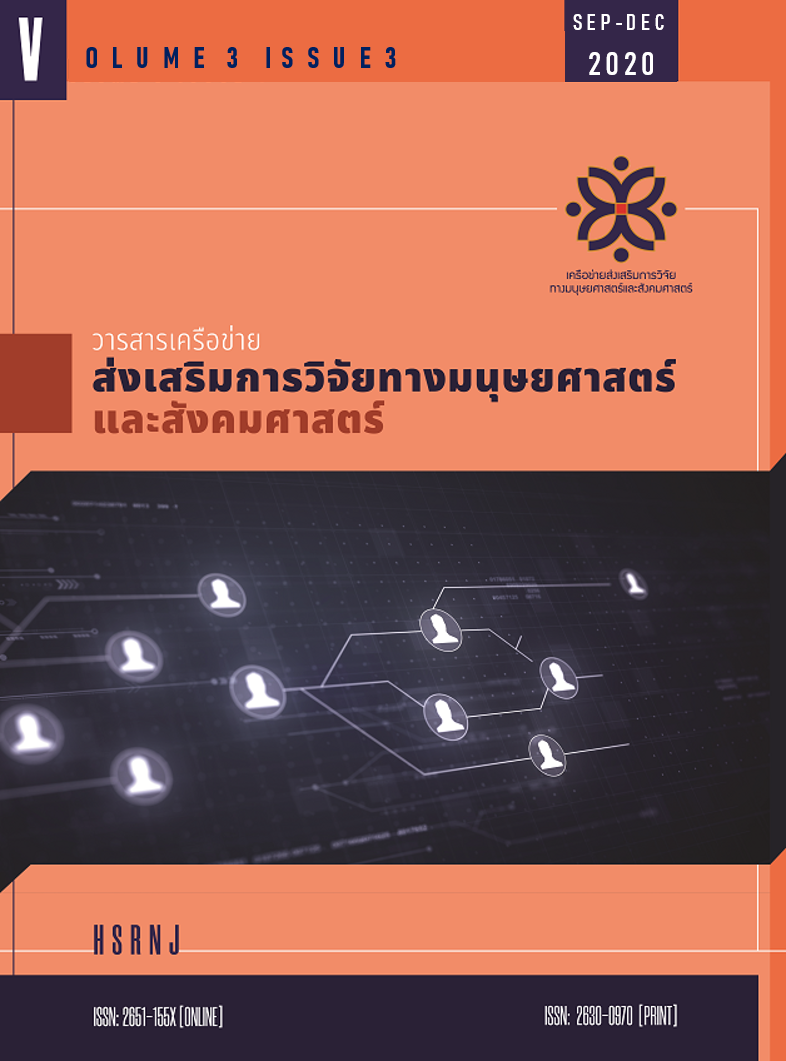ตัวแบบวัฒนธรรมองค์การแห่งความยั่งยืน
คำสำคัญ:
วัฒนธรรมองค์การ, ความยั่งยืนบทคัดย่อ
บทความวัฒนธรรมองค์การแห่งความยั่งยืนนี้มีวัตถุประสงค์ 1) เพื่อศึกษาปัจจัยด้านวัฒนธรรมองค์การที่นำพาธุรกิจเติบโตยั่งยืนได้ในระยะยาว 2) เพื่อนำเสนอแสดงผังมโนทัศน์ตัวแบบวัฒนธรรมองค์การแห่งความยั่งยืน วัฒนธรรมองค์การ มีบทบาทสำคัญต่อความสำเร็จและการเติบโตขององค์การนั้น ๆ เป็นตัวกําหนดเอกลักษณ์ของแต่ละองค์การ เป็นตัวเชื่อมโยงความสัมพันธ์ระหว่างสมาชิกกับองค์การ เกิดเป็นค่านิยม บรรทัดฐาน และการแสดงออกของพฤติกรรมร่วมกันของสมาชิกในองค์การ จึงควรสร้างและพัฒนาวัฒนธรรมองค์การให้สอดคล้องกับการเปลี่ยนแปลงเพื่อนำพาให้องค์การสู่ความสําเร็จตามเป้าหมาย สามารถผ่านพ้นวิกฤตต่าง ๆ ได้ และเติบโตอย่างยั่งยืน โดยรูปแบบวัฒนธรรมองค์การแห่งความยั่งยืนประกอบด้วย 4 ด้าน ดังนี้ 1) วัฒนธรรมการปรับตัว 2) วัฒนธรรมด้านพันธกิจ 3) วัฒนธรรมการมีส่วนร่วม และ 4) วัฒนธรรมการมีเอกภาพ ผ่าน 5 กระบวนหลักในการดำเนินธุรกิจเพื่อการขับเคลื่อนธุรกิจสู่การเติบโตยั่งยืน ควบคู่ไปกับการดำเนินงานอย่างมีความรับผิดชอบต่อสังคมและสิ่งแวดล้อม
เอกสารอ้างอิง
เฉลิมพร ทองบุญชู. (2557). องค์กรแห่งความยั่งยืน จากฐานหลักเศรษฐกิจพอเพียงและการจัดการทั่วทั้งองค์กร. (วิทยานิพนธ์ปริญญาดุษฎีบัณฑิต, มหาวิทยาลัยกรุงเทพธนบุรี).
ณัฐวรรณ พุ่มดียิ่ง (2556). วัฒนธรรมองค์การของมหาวิทยาลัยราชภัฎ. (วิทยานิพนธ์ปริญญาปรัชญาดุษฎีบัณฑิต, มหาวิทยาลัยศิลปากร).
ปริณ บุญฉลวย (2556). วัฒนธรรมองค์การ องค์การการเรียนรู้ กับประสิทธิผลองค์การ ของศาลยุติธรรม: ตัวแบบสมการโครงสร้าง. (วิทยานิพนธ์ปริญญาปรัชญาดุษฎีบัณฑิต, สถาบันบัณฑิตพัฒนบริหารศาสตร์, กรุงเทพมหานคร.
พิริยาภรณ์ อันทอง และคณะ. (2559). Checklist เพื่อธุรกิจยั่งยืน. กรุงเทพมหานคร: ศูนย์พัฒนาความรับผิดชอบต่อสังคม ตลาดหลักทรัพย์แห่งประเทศไทย.
วิรัช สงวนวงศ์. (2548). พฤติกรรมองค์การ. กรุงเทพมหานคร.
วิโรจน์ สารรัตนะ. (2546). การบริหารการศึกษา : หลักการ ทฤษฎี หน้าที่ ประเด็น และบทวิเคราะห์ พิมพ์ครั้งที่ 4. กรุงเทพฯ: โรงพิมพ์ทิพย์วิสุทธิ์.
ศิริพงษ์ เศาภายน. (2551). ปัจจัยที่ส่งผลต่อพฤติกรรมการปฏิบัติงานของผู้บริหารสถานศึกษา. (ภาควิชาบริหารการศึกษาและอุดมศึกษา, มหาวิทยาลัยรามคำแหง).
ศูนย์พัฒนาธุรกิจเพื่อความยั่งยืน. (2563). หลักการและแนวคิดการพัฒนาองค์กรสู่ความยั่งยืน. ตลาดหลักทรัพย์แห่งประเทศไทย. สืบค้นจาก https://www.setsustainability.com/page/sustainability-management-process
Alvesson, M., & Berg, P. O. (1992). Corporate culture and organizational symbolism. Journal of Business Communication, 92 (1): 92-116
Cameron, K. S. & Ettington, D. R. (1988). The Conceptual Foundations of Organizational Culture. In Higher Education: Handbook of Theory and Research. J. C. Smart, ed. Vol. 4. New York: Agathon.
Cameron, K. S. & Quinn, R. E. (1999). Diagnosing and Changing Organizational Culture. Reading, MA: Addison-Wesley.
Denison, D. R. (1990). Corporate Culture and Organizational Effectiveness. New York: Wiley.
Denison, D. R. & Mishra, A. (1995). Toward a Theory of Organizational Culture and Effectiveness. Organizational Science. 6, 204-223.
O'Reilly, C. A.;Chatman, J. &Caldwell, D. F. (1991). People and Organizational Culture: A Profile Comparison Approach to Assessing Person-organization Fit. Academy of Management Journal, 34, 487-516.
Robbins, Stephen P. (1990). Organization Theory: Structure, Design, and Applications. Englewood Cliffs. N.J.: Prentice-Hall.
Schein, E. H. (2004). Organizational Culture and Leadership (3rd ed). San Francisco: Jossey-Bass.
Simon, Herbert A. (1960). Administrative Behavior. New York: The McMillen Company.
ดาวน์โหลด
เผยแพร่แล้ว
รูปแบบการอ้างอิง
ฉบับ
ประเภทบทความ
สัญญาอนุญาต
บทความที่ได้รับการตีพิมพ์เป็นลิขสิทธิ์ของ ผู้เขียน
ทัศนะและความคิดเห็นที่ปรากฏในบทความในวารสารเครือข่ายส่งเสริมการวิจัยทางมนุษยศาสตร์และสังคมศาสตร์จะถือเป็นความรับผิดชอบของผู้เขียนบทความนั้น และไม่ถือเป็นทัศนะและความรับผิดชอบของกองบรรณาธิการ








